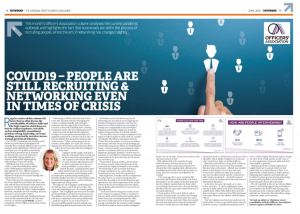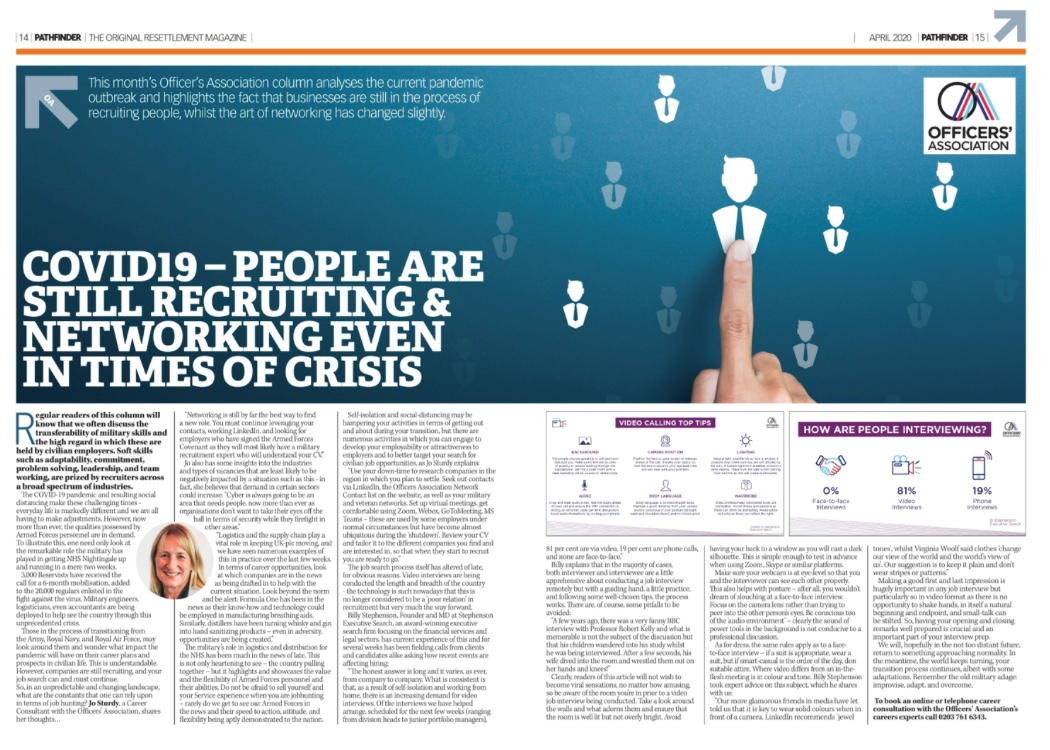Each month inside Pathfinder, The Officers’ Association writes a column on an array of elements connected to finding a job on leaving the military. In our special April issue, the OA highlight the fact people are still recruiting and networking even through the COVID19 outbreak.

Read the April issue of Pathfinder for free here.
Regular readers of this column will know that we often discuss the transferability of military skills and the high regard in which these are held by civilian employers. Soft skills such as adaptability, commitment, problem solving, leadership, and team working, are prized by recruiters across a broad spectrum of industries.
The COVID-19 pandemic and resulting social distancing make these challenging times – everyday life is markedly different and we are all having to make adjustments. However, now more than ever, the qualities possessed by Armed Forces personnel are in demand. To illustrate this, one need only look at the remarkable role the military has played in getting NHS Nightingale up and running in a mere two weeks.
3,000 Reservists have received the call for a 6-month mobilisation, added to the 20,000 regulars enlisted in the fight against the virus. Military engineers, logisticians, even accountants are being deployed to help see the country through this unprecedented crisis.
Those in the process of transitioning from the Army, Royal Navy, and Royal Air Force, may look around them and wonder what impact the pandemic will have on their career plans and prospects in civilian life. This is understandable. However, companies are still recruiting, and your job search can and must continue.
So, in an unpredictable and changing landscape, what are the constants that one can rely upon in terms of job hunting? Jo Sturdy, a Career Consultant with the Officers’ Association, shares her thoughts…
“Networking is still by far the best way to find a new role. You must continue leveraging your contacts, working LinkedIn, and looking for employers who have signed the Armed Forces Covenant as they will most likely have a military recruitment expert who will understand your CV.”
Jo also has some insights into the industries and types of vacancies that are least likely to be negatively impacted by a situation such as this – in fact, she believes that demand in certain sectors could increase: “Cyber is always going to be an area that needs people, now more than ever as organisations don’t want to take their eyes off the ball in terms of security while they firefight in other areas.”
“Logistics and the supply chain play a vital role in keeping UK-plc moving, and we have seen numerous examples of this in practice over the last few weeks. In terms of career opportunities, look at which companies are in the news as being drafted in to help with the current situation. Look beyond the norm and be alert: Formula One has been in the news as their know-how and technology could be employed in manufacturing breathing aids. Similarly, distillers have been turning whisky and gin into hand sanitizing products – even in adversity, opportunities are being created.”
The military’s role in logistics and distribution for the NHS has been much in the news of late. This is not only heartening to see – the country pulling together – but it highlights and showcases the value and the flexibility of Armed Forces personnel and their abilities. Do not be afraid to sell yourself and your Service experience when you are jobhunting – rarely do we get to see our Armed Forces in the news and their speed to action, attitude, and flexibility being aptly demonstrated to the nation.
Self-isolation and social-distancing may be hampering your activities in terms of getting out and about during your transition, but there are numerous activities in which you can engage to develop your employability or attractiveness to employers and to better target your search for civilian job opportunities, as Jo Sturdy explains:
“Use your down-time to research companies in the region in which you plan to settle. Seek out contacts via LinkedIn, the Officers Association Network Contact list on the website, as well as your military and veteran networks. Set up virtual meetings, get comfortable using Zoom, Webex, GoToMeeting, MS Teams – these are used by some employers under normal circumstances but have become almost ubiquitous during the ‘shutdown’. Review your CV and tailor it to the different companies you find and are interested in, so that when they start to recruit you are ready to go.”
The job search process itself has altered of late, for obvious reasons. Video interviews are being conducted the length and breadth of the country – the technology is such nowadays that this is no longer considered to be a ‘poor relation’ in recruitment but very much the way forward.
Billy Stephenson, Founder and MD at Stephenson Executive Search, an award-winning executive search firm focusing on the financial services and legal sectors, has current experience of this and for several weeks has been fielding calls from clients and candidates alike asking how recent events are affecting hiring:
“The honest answer is long and it varies, as ever, from company to company. What is consistent is that, as a result of self-isolation and working from home, there is an increasing demand for video interviews. Of the interviews we have helped arrange, scheduled for the next few weeks (ranging from division heads to junior portfolio managers), 81 per cent are via video, 19 per cent are phone calls, and none are face-to-face.”
Billy explains that in the majority of cases, both interviewer and interviewee are a little apprehensive about conducting a job interview remotely but with a guiding hand, a little practice, and following some well-chosen tips, the process works. There are, of course, some pitfalls to be avoided:
“A few years ago, there was a very funny BBC interview with Professor Robert Kelly and what is memorable is not the subject of the discussion but that his children wandered into his study whilst he was being interviewed. After a few seconds, his wife dived into the room and wrestled them out on her hands and knees!”
Clearly, readers of this article will not wish to become viral sensations, no matter how amusing, so be aware of the room you’re in prior to a video job interview being conducted. Take a look around the walls and what adorns them and ensure that the room is well lit but not overly bright. Avoid having your back to a window as you will cast a dark silhouette. This is simple enough to test in advance when using Zoom, Skype or similar platforms.
Make sure your webcam is at eye-level so that you and the interviewer can see each other properly. This also helps with posture – after all, you wouldn’t dream of slouching at a face-to-face interview. Focus on the camera lens rather than trying to peer into the other person’s eyes. Be conscious too of the ‘audio environment’ – clearly the sound of power tools in the background is not conducive to a professional discussion.
As for dress, the same rules apply as to a face-to-face interview – if a suit is appropriate, wear a suit, but if smart-casual is the order of the day, don suitable attire. Where video differs from an in-the-flesh meeting is in colour and tone. Billy Stephenson took expert advice on this subject, which he shares with us:
“Our more glamorous friends in media have let told us that it is key to wear solid colours when in front of a camera. LinkedIn recommends ‘jewel tones’, whilst Virginia Woolf said clothes ‘change our view of the world and the world’s view of us’. Our suggestion is to keep it plain and don’t wear stripes or patterns.”
Making a good first and last impression is hugely important in any job interview but particularly so in video format as there is no opportunity to shake hands, in itself a natural beginning and endpoint, and small-talk can be stilted. So, having your opening and closing remarks well prepared is crucial and an important part of your interview prep.
We will, hopefully in the not too distant future, return to something approaching normality. In the meantime, the world keeps turning, your transition process continues, albeit with some adaptations. Remember the old military adage: improvise, adapt, and overcome.
To book an online or telephone career consultation with the Officers’ Association’s careers experts call 0203 761 6343.

